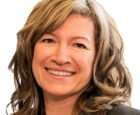Plenty of children grow up loving animals. For Martine Boulianne, a professor at Université de Montréal’s faculty of veterinary medicine, it was her dairy farmer grandfather held a great influence over. During her childhood in northern Quebec – an area dominated by forestry and mining – she always envisioned herself working with animals. Envisioning herself as a multi-animal practitioner, she eventually focused on poultry. It wasn’t just her interest in agriculture that led to this; along the road in her veterinary studies, she realized that “we had no training at the time I was a vet student in poultry medicine at the veterinary college.” She pursued further graduate and veterinary studies to fill that gap, mentored under top poultry pathologists.
As a researcher, she’s developed a reputation as someone who makes complex concepts easy to understand – and she’s helped shape national policies, lending her voice on matters such as biosecurity, health and sustainability. As a mentor, she’s led dozens of students and led the way for many women in animal agricultural science. She’s also an Influential Women in Canadian Agriculture honouree for 2025.
Here are three takeaways from Boulianne’s interview with Canadian Poultry editor Brett Ruffell.
Uplift those you mentor – they will be your collaborators someday.
Boulianne encountered her first major female role model in her post-doc studies at UC Davis in California: Dr. Annie J. King in the department of food sciences. This led her to become acquainted not only with the poultry industry in California, but also the poultry diagnostic systems.
She says she finds she – and her female colleagues – tend to be a bit “motherly” in their approach, ensuring comfort and advocacy for her students. But she also makes sure she respects them as equals.
“Respect is at the essence of the relationships I develop with my graduate students,” she says. “You have to treat them like the future collaborators and colleagues that they are going to be.” Encouragement, debate and dialogue are essential for boosting the confidence of her future collaborators, she says. Active listening is one of her favourite tools both inside and outside of mentorship environments – building on and suggesting solutions applies to industry collaborations just as much as it does to her relationships with students.
Relationships are key in an evolving industry.
Boulianne’s job varies quite a bit. This is, to some degree, the nature of being a professor – classes, research, writing grant proposals and engaging in mentorship are somewhat typical for such a position, meaning her day-to-day can already be so different depending on the day of the week. But the evolution of her career also means she’s seen her settings change a lot in the long term. For this reason, forming strong relationships is key – because Boulianne never knows when she’s going to need to lean on key connections.
“As my career has evolved, my job description has evolved as well,” she says. For example, she used to spend one to two days per week providing services and consultation to breeders and producers. “Over time, research has taken a more important role, as well as the supervision and direction of graduate and undergraduate students.” That said, her close working relationship with industry, which has been developed over years of close working together, has enabled a lot of field trials. “I can make the best of all the worlds – the practice, some more fundamental studies and, of course, the transfer of information.”
This is where that active listening and love of collaboration comes in handy. “[You need] to make sure that everyone understands what the research process involves,” she says. Yes, it involves money, she says, but it involves time. “If the industry has a question and comes to you, the answer won’t be ready tomorrow. Over time, we have built that relationship based on trust and a mutual understanding – and also patience. It’s a long-term process, and over the years, I’ve been very blessed and lucky to be supported by an industry that understands the process.”
Step back, be humble.
Researchers and professors experience setbacks all the time – whether it’s not getting the results you want, not getting a grant or simply not being happy with how a project is going. But Boulianne says there are many opportunities to learn from such setbacks.
There’s nothing wrong with going back to the drawing board. In fact, says Boulianne, it often makes you better. The same patience and resilience she applies to her relationships has applied to the way she works and research. “Be humble enough to realize, ‘well, this was not good enough – let’s forget about it and move on!’”
For Boulianne, attending Guelph as a grad student surrounded primarily by English speakers when her mother tongue was French presented early challenges. “I was not bilingual at all,” she says. And, in an environment where her colleagues were wearing medical masks – not to mention being with an Irish surgeon chewing gum – Boulianne found herself overwhelmed. Knowing mastering English was of the utmost importance, she knew she had to work hard to reach that goal. But keeping calm was key, and Boulianne is proud of herself.















